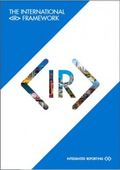INSIGHTS
IIRC launches Integrated Reporting Framework today

 A three year journey traversed by a global coalition of companies, investors, framework providers and NGOs led by the International Integrated Reporting Council (IIRC) has resulted in the publication of a new framework for corporate reporting: The International <IR> Framework. Fronesys welcomes the publication of the framework and is keen to see it being adopted by companies around the world who are committed to transparency, governance and wise decision-making.
A three year journey traversed by a global coalition of companies, investors, framework providers and NGOs led by the International Integrated Reporting Council (IIRC) has resulted in the publication of a new framework for corporate reporting: The International <IR> Framework. Fronesys welcomes the publication of the framework and is keen to see it being adopted by companies around the world who are committed to transparency, governance and wise decision-making.
<IR> applies principles and concepts that are focused on bringing greater cohesion and efficiency to the reporting process, and adopting “integrated thinking” as a way of breaking down internal silos and reducing duplication. It improves the quality of information available to providers of financial capital to enable a more efficient and productive allocation of capital. Its focus on value creation, and the ‘capitals’ used by the business to create value over time, contributes towards a more financially stable global economy and is a force for sustainability.
The Framework will be used to accelerate the adoption of <IR> across the world, where it is currently being trialled in over 25 countries, 16 of which are members of the G20, the group of nations focused on strengthening the global economy.
Commenting on the release of the Framework, IIRC Chairman Professor Mervyn King SC, said, “We have been taken aback by the degree to which mainstream businesses and investors have been willing to participate in creating this Framework and embarking on their own <IR> journey. Last month PepsiCo became the latest global company to sign up to the IIRC’s 100-plus strong business network, which includes HSBC, Unilever, Deutsche Bank, China Light & Power, Hyundai Engineering and Construction, National Australia Bank and Tata Steel.”
Jyoti Banerjee, partner at Fronesys, who worked with the IIRC’s management team in developing its plans for the release of the framework, had this to say: “Corporate reporting, as practiced today across the world, is broken. It is broken because it is almost always only about the financial performance of a company – we now know that in most modern companies, the financial statements only capture around a quarter of the value they create. It is also broken because reporting is usually focused on a single period, say a quarter or a year. And it is broken because it is backwards-looking. We need a better way to understand how companies create value, and a better way to help investors make good capital allocation decisions. The <IR> Framework offers just such a solution to the crisis in corporate reporting.”
For more information about the <IR> Framework, please see: http://www.theiirc.org/international-ir-framework/.
MORE FROM INSIGHTS
Assessing the impacts and outcomes of integrated reporting
Fronesys founders played influential roles in the development of the integrated reporting movement, a corporate reporting mechanism that now has around two thousand listed companies as its adopters, and which is now part of the mainstream of corporate reporting. So, perhaps, now is as good a time as any for Jyoti Banerjee to look back and assess the outcomes and impacts, as well as the what-might-have-beens, of this new form of corporate reporting.
Integrated thinking is focus of chapter in new Oxford handbook
Oxford University Press has just released a new chapter from the forthcoming Oxford Handbook of Food, Water and Society: Integrating Multi-Capital Thinking in Business Decisions. The new chapter, contributed by Fronesys partner Jyoti Banerjee, explores how we need to change our understanding of value. Here is Jyoti’s account of what you can expect in this new publication.
A Shift in Perspective – How Universities Create Value
Jyoti Banerjee, partner at Fronesys, highlights that by adopting the principles of integrated thinking and reporting, universities can move away from a focus on reporting short term financial metrics to a multi-stakeholder approach which offers compelling narratives about their value.




0 Comments